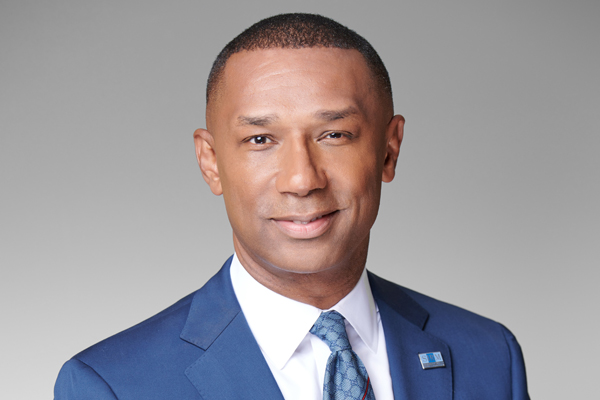Taylor seeks to elevate, not just represent, HR profession
Taylor seeks to elevate, not just represent, HR profession
- July 23, 2021 |
-
 CEO Update
CEO Update

2021 AWARD HONOREE: PROFESSIONAL SOCIETY CEO OF THE YEAR
Newly published author made waves by participating in Trump workforce advisory board, but says ‘SHRM has to be at the table'
 Taylor
Taylor
CEO Update: What characteristics do professional society CEOs need to succeed today?
Johnny C. Taylor Jr.: You've got to have courage.
Association Leadership Awards
Read profiles of 2021 ALA honorees Leslie Sarasin of FMI—The Food Industry Association and Kristin Bass of the Pharmaceutical Care Management Association.
For information about the Sept. 23 event, go to AssociationLeadershipAwards.com
If you want to be relevant, and you want to make a difference in an incredibly divided country, you simply must be able to make very thoughtful, well-informed decisions, and do that with courage. Recognize that in the short run, it's going to be uncomfortable. If you play it safe, then you are limiting your ability to make the type of impact you should have on society. People resist change. So buckle up and get ready for the ride and play the long game. Professional societies have an obligation now to not just serve their profession, but to make the world better through their profession.
CU: What has been your greatest accomplishment since taking over SHRM in late 2017?
JT: Elevating the HR profession. We are now being invited to the White House consistently, being invited to Congress and to federal agencies. There's a real recognition that HR matters and that HR people should be at the table (helping set public policy). But also elevating the HR professional. We all think very highly of doctors, lawyers and firemen. But HR, from a branding standpoint, has been pretty low. It's been personnel. People make jokes about it. "The Office," right? And I'm very proud that now we're elevating people, not just the profession. CEOs are talking about human capital management, they're talking about culture (rather than just about compliance).
CU: What do you see as the role of a professional society in elevating the profession?
JT: Our role is to more broadly protect the interests of workers and employers. Historically, our job was to ensure that the HR profession was taken care of. Issues of labor were for the labor unions; issues of diversity, equity and inclusion were for the civil rights community. We had to literally pivot and take on a broader remit. We've got an obligation to society to ensure that people enjoy the dignity of work, and that employers get a fair return on that investment.
CU: What has been your biggest gamble as an association CEO?
JT: The gamble was working with the Trump administration (by joining President Donald Trump's American Workforce Policy Advisory Board). We had agreed philosophically that we were going to engage with policymakers. I joined when Trump was president, in 2017. The big question was, do you want to go out strong on policy now? Because the result may be that people think you're aligning with this president.
But SHRM has to be at the table if decisions are being made. We caught pure flak. Whenever you make a policy argument that people believe is a political argument, you then come under siege. We have learned that taking any position is fraught with risk to your brand and to your business. But SHRM has truly elevated our brand, the profession and the full conversation.
CU: This year your book "Reset: A Leader's Guide to Work in an Age of Upheaval" was published. Why did you write it?
JT: The pandemic was a pause button on life. And then you have the opportunity for a reset. That's what we saw in the world of work-—in some ways, a total reset. One thing that stood out to me was the irony that people received unemployment benefits who have never been employed. All those gig workers got enhanced unemployment insurance benefits. In the past, if you were not an employee, if you lost your gig, you didn't get paid. So, we redefined that entire concept. That's different forever. We literally refought the entire idea of working remotely, which had been seen as a perk, or an accommodation, not the way some people will work going forward.
Career highlights
Broad background: Taylor, who has a law degree from Drake University in Des Moines, Iowa, has held a variety of senior legal, HR and executive positions in both the for-profit and nonprofit spheres, including Paramount Pictures Live Entertainment Group, foodservice company Compass Group USA, law firm McGuireWoods and media and internet company IAC/Interactive Corp. He was president and CEO of the Thurgood Marshall College Fund for seven years before joining SHRM in 2017.
Ask him anything: Taylor writes a weekly "Ask HR" column for USA Today. One recent installment dealt with whether an employer can fire someone for not being a good culture fit. Answer: Yes, provided the decision is not driven by illegal discrimination.
Tech savvy: Taylor created the association's workplace innovation and venture capital arm, SHRMLabs. "We weren't involved in the ecosystem that was making decisions about what a good investment is. So we said we should play a big role in what is work tech or HR tech," he said.
